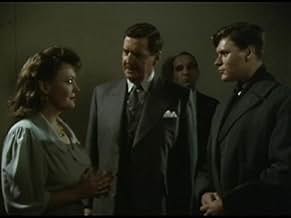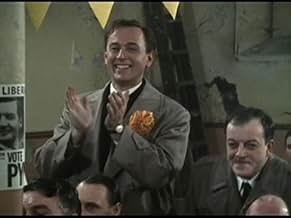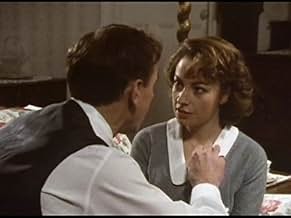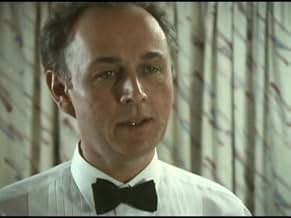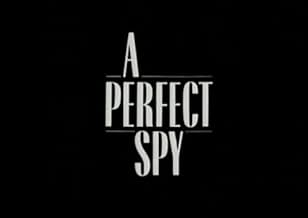A Perfect Spy
- Mini-série télévisée
- 1987
- 6h 14min
NOTE IMDb
7,3/10
1,1 k
MA NOTE
L'ascension et la chute de Magnus Pym et sa carrière dans le renseignement. Des rencontres fortuites avec des personnes qui seront importantes pour lui à l'avenir à une vie en Tchécoslovaqui... Tout lireL'ascension et la chute de Magnus Pym et sa carrière dans le renseignement. Des rencontres fortuites avec des personnes qui seront importantes pour lui à l'avenir à une vie en Tchécoslovaquie.L'ascension et la chute de Magnus Pym et sa carrière dans le renseignement. Des rencontres fortuites avec des personnes qui seront importantes pour lui à l'avenir à une vie en Tchécoslovaquie.
- Nommé pour 2 Primetime Emmys
- 1 victoire et 6 nominations au total
Parcourir les épisodes
Avis à la une
If Smiley's People and Tinker Tailor Spy were about the "how" of espionage, A Perfect Spy is about the "who".
Whereas the first two were essentially two long investigations, A Perfect Spy, which begins as a non-linear story line in the novel, is about the socio-psychological components of what goes into making a spy.
While those who have read the book will find this adaptation surprising, it is also one of the finest. The story is linear, starting with a young Magnus, his con father, and his acolytes.
The background of the series is about the issue of what I would call inverted loyalties. Time and again, we see Magnus' relationship with his father as one where the former is criminally tolerant and indulgent, as any son with a deranged father might. During Magnus' childhood, and through his mentoring by Jack Brotherhood, we see an individual with divided loyalties, but seemingly true to both.
What this creates for the viewer is the impression that the good guys are actually bad, and vice versa, without resorting to any literary or artistic device. For example, we see immediately that Axel is initially harmless, but while he does something objectionable, nevertheless remains very attaching. For Magnus, it is the same. The buildup of his character during childhood only strengthens our sympathy for him. The reality is only revealed when Egan's character towards the end, when the Americans are catching on) starts to decompose.
To my taste, the series spends too much time on the childhood of the hero character. There are also devices taken from the book that are clearly unnecessary for the series (the green filing cabinet for example), and the relationship with Brotherhood could have been expanded, for the sake of balance with that of Axel Hampel.
Not to be sexist, but the women in the series are simply annoying. Also, their role in Magnus', Jack's professional lives and the spy craft is merely as sex-pots, which doesn't always conform to the zeitgeist. Although this was perhaps truer in the 1970s, when the novel's action was taking place. Also, some people don't seem to age, yet, they've been apparently working since the end of WW2; i.e. Jack Brotherhood, from 1947 to 1987 without a grey hair...
Overall, however, we see compelling acting. Egan, MacAnally, Weigang at the summit of their art.
The last ten minutes of the series is the finest acting ever filmed or seen.
Whereas the first two were essentially two long investigations, A Perfect Spy, which begins as a non-linear story line in the novel, is about the socio-psychological components of what goes into making a spy.
While those who have read the book will find this adaptation surprising, it is also one of the finest. The story is linear, starting with a young Magnus, his con father, and his acolytes.
The background of the series is about the issue of what I would call inverted loyalties. Time and again, we see Magnus' relationship with his father as one where the former is criminally tolerant and indulgent, as any son with a deranged father might. During Magnus' childhood, and through his mentoring by Jack Brotherhood, we see an individual with divided loyalties, but seemingly true to both.
What this creates for the viewer is the impression that the good guys are actually bad, and vice versa, without resorting to any literary or artistic device. For example, we see immediately that Axel is initially harmless, but while he does something objectionable, nevertheless remains very attaching. For Magnus, it is the same. The buildup of his character during childhood only strengthens our sympathy for him. The reality is only revealed when Egan's character towards the end, when the Americans are catching on) starts to decompose.
To my taste, the series spends too much time on the childhood of the hero character. There are also devices taken from the book that are clearly unnecessary for the series (the green filing cabinet for example), and the relationship with Brotherhood could have been expanded, for the sake of balance with that of Axel Hampel.
Not to be sexist, but the women in the series are simply annoying. Also, their role in Magnus', Jack's professional lives and the spy craft is merely as sex-pots, which doesn't always conform to the zeitgeist. Although this was perhaps truer in the 1970s, when the novel's action was taking place. Also, some people don't seem to age, yet, they've been apparently working since the end of WW2; i.e. Jack Brotherhood, from 1947 to 1987 without a grey hair...
Overall, however, we see compelling acting. Egan, MacAnally, Weigang at the summit of their art.
The last ten minutes of the series is the finest acting ever filmed or seen.
There is a brilliant lesson of sorts here about narrative depth, but you must know the book. Lavishly conceived by Le Carre as his magnum opus, the book is not any other spy thriller you picked up on an airport, it's one of the most tantalizing I know. The center is this, a mysterious man, posing as someone else, is holed up in a small room in Dorset overlooking the ocean and recalls a whole journey through life.
The childhood stream-of-consciousness where he attempts to be Faulkner without conquering the madness doesn't work; so much else does. It has a strong sense of presence in several places from Greek islands to Washington, the center of control. It has a sense of anxious premonition about the extents of control. It has a narrator writing a memoir while efforts are underway to apprehend him before he defects to the other side. It has several relationships of ambiguous love defined in his imagination. It has a disappearance in the middle of the night and a strange encounter in a Czech barn.
This, it just won't do.
The most glaring fault by far is that they simplified the structure, making it a linear telling in one go (practically). The childhood segment works even less because when seen, it loses the shroud of memory. Seeing Rick is never going to be as powerful as sensing him move through room's of the son's memory. It still covers most of the narrative ground but we lose the premonition, we lose the mystifying sense of machinery set in motion long ago and discovered only when the ground beneath our feet shifts, we lose the depth of the betrayal of love. We lose it all and get a nicely groomed play. Its idea of profound emotion is actors grimacing in close up; I was stunned to see that it's from the late 80s, it looks 20 years older.
I don't know if this is watchable fiction, maybe it is, but it's a complete catastrophe where it should go beyond it and give us lives, contact, sense, everything Le Carre strove to have it slide through portals of remembrance is reduced to the Cliff notes version.
But something weird happens. To see this and to have known the book is to have images of something I've known as deeper, more elusive, more rending and this, for me, was to recall even the book as deeper than Le Carre managed with words. A powerful scene in the film exemplifies just this, when his wife, alarmed by events, begins to read an unfinished manuscript he's left behind, ostensibly a novel he's writing (he says), but she suspects it's more, we know it's more, it's the disguised recollections of a lifetime (this is completely flattened in this linear telling).
She cries as she reads about betrayal as hope, as salvation, as an adventure for the imaginative soul, but oh how much more maddeningly full is the life behind the words. His wife, his mentor in the service, will they ever truly know? To know this is to realize how much we won't truly know in turn. There's only so much you can say and so easy to misunderstand. What Le Carre doesn't put to words around this life deserves its Tarkovsky film.
The childhood stream-of-consciousness where he attempts to be Faulkner without conquering the madness doesn't work; so much else does. It has a strong sense of presence in several places from Greek islands to Washington, the center of control. It has a sense of anxious premonition about the extents of control. It has a narrator writing a memoir while efforts are underway to apprehend him before he defects to the other side. It has several relationships of ambiguous love defined in his imagination. It has a disappearance in the middle of the night and a strange encounter in a Czech barn.
This, it just won't do.
The most glaring fault by far is that they simplified the structure, making it a linear telling in one go (practically). The childhood segment works even less because when seen, it loses the shroud of memory. Seeing Rick is never going to be as powerful as sensing him move through room's of the son's memory. It still covers most of the narrative ground but we lose the premonition, we lose the mystifying sense of machinery set in motion long ago and discovered only when the ground beneath our feet shifts, we lose the depth of the betrayal of love. We lose it all and get a nicely groomed play. Its idea of profound emotion is actors grimacing in close up; I was stunned to see that it's from the late 80s, it looks 20 years older.
I don't know if this is watchable fiction, maybe it is, but it's a complete catastrophe where it should go beyond it and give us lives, contact, sense, everything Le Carre strove to have it slide through portals of remembrance is reduced to the Cliff notes version.
But something weird happens. To see this and to have known the book is to have images of something I've known as deeper, more elusive, more rending and this, for me, was to recall even the book as deeper than Le Carre managed with words. A powerful scene in the film exemplifies just this, when his wife, alarmed by events, begins to read an unfinished manuscript he's left behind, ostensibly a novel he's writing (he says), but she suspects it's more, we know it's more, it's the disguised recollections of a lifetime (this is completely flattened in this linear telling).
She cries as she reads about betrayal as hope, as salvation, as an adventure for the imaginative soul, but oh how much more maddeningly full is the life behind the words. His wife, his mentor in the service, will they ever truly know? To know this is to realize how much we won't truly know in turn. There's only so much you can say and so easy to misunderstand. What Le Carre doesn't put to words around this life deserves its Tarkovsky film.
This is an extremely long movie, which means you may become very bored before it becomes interesting, but its length provides opportunity for its characters to find permanent attachment in your sympathies.
If you are moved by the guilt of the loathsome you will find it particularly heart-wrenching, because it is a story that finds its heroes among the evil and the weak. If you can love a monster you'll cry for Magnus Pym, the spy who betrays everyone - notably his country, his friends and family - a man who has also been manipulated and moulded since childhood by those same people.
There isn't one truly likeable character in the entire story, not one loyal, 'moral' personality to sympathise with. But watching the whole thing without the help of a tissue would be quite remarkable.
I really enjoyed it in the end. Well worth it for people who like inciteful movies about baser human character.
If you are moved by the guilt of the loathsome you will find it particularly heart-wrenching, because it is a story that finds its heroes among the evil and the weak. If you can love a monster you'll cry for Magnus Pym, the spy who betrays everyone - notably his country, his friends and family - a man who has also been manipulated and moulded since childhood by those same people.
There isn't one truly likeable character in the entire story, not one loyal, 'moral' personality to sympathise with. But watching the whole thing without the help of a tissue would be quite remarkable.
I really enjoyed it in the end. Well worth it for people who like inciteful movies about baser human character.
I rather liked this BBC TV adaptation of John le Carré's highly regarded book.
Very difficult to give it a rating! In the end, I've settled on 7, although some aspects warranted 8 or more.
This TV version of The Perfect Spy was aired by the BBC in 1987. It is very dated in the way it looks, the cold war spy story, the way it's told, and the way the screenplay is constructed. TV drama series just don't look like or do this anymore. It's 37 years old. Also, it's sloooow burn - a mood piece, which relies on some talking heads, tense room situations, and a sprinkling of violin music. It's OK actually! I'm of an age now where I can appreciate this sort of thing. If you want wham-blam - then you are looking in the wrong place!
Benedict Taylor, and then Peter Egan are Magnus Pym - a spy who plays for both sides. In a sense, this is not the most important thing here though. In it's place, the thing offered is that the Magnus Pym character is unmoored. He doesn't seem to have any moral code. This, in part, must be due to his father "Rick" Pym, played brilliantly by Ray McAnally. He is a crook of the worst kind, defrauding anyone he can get money out of. Because McAnally plays the father so well, we get a sense of the reverence he elicts from his son in earlier years. But he is the worst kind of role model, full of smooth emotional blackmail. I liked the way that "Rick" keeps popping up over time. In the end, confused and frustrated by his influence, Magnus tries to keep him away. It's as if Magnus is running away from him and everything he represents. But he doesn't really escape, he simply evolves into another version of his father. We see this especially towards the end. That's my interpretation anyway.
There is a lot going on in The Perfect Spy, with many relationships - most of which are damaged, manipulative and inauthentic. Perhaps the most important and defining pairing, is Magnus's lonstanding & influential friendship with Axel Hampel - a Czech agent, played wonderfully by Rüdiger Weigang.
In the end, Magnus Pym is a moral desert - a game player who never comes to terms with who he is, what he does, or why he does it.
The Perfect Spy falls down a little in a few places. We don't see what Magnus really does, and only some of the influence he really has. We find it hard to keep up with the female characters - who are often used and mistreated. There are gaps and failures to explain or give insight. Instead, we see what Magnus comes to realise only at the end....
Very difficult to give it a rating! In the end, I've settled on 7, although some aspects warranted 8 or more.
This TV version of The Perfect Spy was aired by the BBC in 1987. It is very dated in the way it looks, the cold war spy story, the way it's told, and the way the screenplay is constructed. TV drama series just don't look like or do this anymore. It's 37 years old. Also, it's sloooow burn - a mood piece, which relies on some talking heads, tense room situations, and a sprinkling of violin music. It's OK actually! I'm of an age now where I can appreciate this sort of thing. If you want wham-blam - then you are looking in the wrong place!
Benedict Taylor, and then Peter Egan are Magnus Pym - a spy who plays for both sides. In a sense, this is not the most important thing here though. In it's place, the thing offered is that the Magnus Pym character is unmoored. He doesn't seem to have any moral code. This, in part, must be due to his father "Rick" Pym, played brilliantly by Ray McAnally. He is a crook of the worst kind, defrauding anyone he can get money out of. Because McAnally plays the father so well, we get a sense of the reverence he elicts from his son in earlier years. But he is the worst kind of role model, full of smooth emotional blackmail. I liked the way that "Rick" keeps popping up over time. In the end, confused and frustrated by his influence, Magnus tries to keep him away. It's as if Magnus is running away from him and everything he represents. But he doesn't really escape, he simply evolves into another version of his father. We see this especially towards the end. That's my interpretation anyway.
There is a lot going on in The Perfect Spy, with many relationships - most of which are damaged, manipulative and inauthentic. Perhaps the most important and defining pairing, is Magnus's lonstanding & influential friendship with Axel Hampel - a Czech agent, played wonderfully by Rüdiger Weigang.
In the end, Magnus Pym is a moral desert - a game player who never comes to terms with who he is, what he does, or why he does it.
The Perfect Spy falls down a little in a few places. We don't see what Magnus really does, and only some of the influence he really has. We find it hard to keep up with the female characters - who are often used and mistreated. There are gaps and failures to explain or give insight. Instead, we see what Magnus comes to realise only at the end....
This is my second time through for A Perfect Spy. I watched it 2 or 3 years ago and liked it. I like it still. It's natural that it gets compared to the beeb's other big Le Carre' series, Tinker Tailor Soldier Spy. Tinker Tailor focuses on the "game" spies play; Perfect Spy gives us the other axis - what kind of person a spy is. There are a number of themes that these movies share, along with others in the genre.
Ambiguity - moral, sexual, interpersonal - which creates a multidimensional space of true vs. false, inside vs. outside, love vs. responsibility. In a way, these characters are happiest when they are being treated the most shabbily by those they love and respect - "backstabbed" in its various nuances.
The theme of fathers and father-figures is also important. One of the most intriguing characters in A Perfect Spy is Rick, the main character Magnus' perhaps ersatz father. Throughout the story he betrays and is betrayed. A rogue who always manages to climb back up the ladder when he's been toppled, who seems impervious to what others think of him, asks Magnus each time they meet, "Do you love your old man?" and never, "Do you love me?" Maybe it says this somewhere else, but A Perfect Spy is a love story.
Another theme is that of malignancy. The nature of the business is to turn others - turn them against their government, against their friends and associates, turn them against their values and beliefs. In each of the Le Carre' movies I have seen, The Spy who Came in From the Cold, Looking Glass War, Tinker Tailor Soldier Spy, Smiley's People, and A Perfect Spy, turning and being turned is the foundation of the tragedy.
Finally, not so much a theme as an artistic touch - in each of these films there is usually only a single gun shot, or perhaps two shots bookending the story. Violence, torture, cruelty are always just beneath the surface. We see their results not as streams of blood or dank prison cells but in the the objects Le Carre''s characters cling to as they are ineluctably sucked down into the morass.
If you haven't seen the films above, and you enjoy A Perfect Spy, you are in for a treat. I'd also recommend The Sandbagger series (Yorkshire TV), the 2nd and 3rd seasons of which begin to reach the level of this kind of complexity. The IPCRESS File and Burial in Berlin are nice, though light weight. For political intrigue try A Very British Coup, House of Cards and Yes, Minister/Yes, Prime Minister.
If only a brit would set his hand to making The Three Kingdoms - there would be a film with intrigue and complexity.
Ambiguity - moral, sexual, interpersonal - which creates a multidimensional space of true vs. false, inside vs. outside, love vs. responsibility. In a way, these characters are happiest when they are being treated the most shabbily by those they love and respect - "backstabbed" in its various nuances.
The theme of fathers and father-figures is also important. One of the most intriguing characters in A Perfect Spy is Rick, the main character Magnus' perhaps ersatz father. Throughout the story he betrays and is betrayed. A rogue who always manages to climb back up the ladder when he's been toppled, who seems impervious to what others think of him, asks Magnus each time they meet, "Do you love your old man?" and never, "Do you love me?" Maybe it says this somewhere else, but A Perfect Spy is a love story.
Another theme is that of malignancy. The nature of the business is to turn others - turn them against their government, against their friends and associates, turn them against their values and beliefs. In each of the Le Carre' movies I have seen, The Spy who Came in From the Cold, Looking Glass War, Tinker Tailor Soldier Spy, Smiley's People, and A Perfect Spy, turning and being turned is the foundation of the tragedy.
Finally, not so much a theme as an artistic touch - in each of these films there is usually only a single gun shot, or perhaps two shots bookending the story. Violence, torture, cruelty are always just beneath the surface. We see their results not as streams of blood or dank prison cells but in the the objects Le Carre''s characters cling to as they are ineluctably sucked down into the morass.
If you haven't seen the films above, and you enjoy A Perfect Spy, you are in for a treat. I'd also recommend The Sandbagger series (Yorkshire TV), the 2nd and 3rd seasons of which begin to reach the level of this kind of complexity. The IPCRESS File and Burial in Berlin are nice, though light weight. For political intrigue try A Very British Coup, House of Cards and Yes, Minister/Yes, Prime Minister.
If only a brit would set his hand to making The Three Kingdoms - there would be a film with intrigue and complexity.
Le saviez-vous
- AnecdotesAccording to source novelist John le Carré, the character of Rick Pym (Ray McAnally) is heavily based upon his own father.
- ConnexionsFeatured in Wogan: Épisode #9.10 (1989)
Meilleurs choix
Connectez-vous pour évaluer et suivre la liste de favoris afin de recevoir des recommandations personnalisées
- How many seasons does A Perfect Spy have?Alimenté par Alexa
Détails
Contribuer à cette page
Suggérer une modification ou ajouter du contenu manquant

Lacune principale
By what name was A Perfect Spy (1987) officially released in India in English?
Répondre






